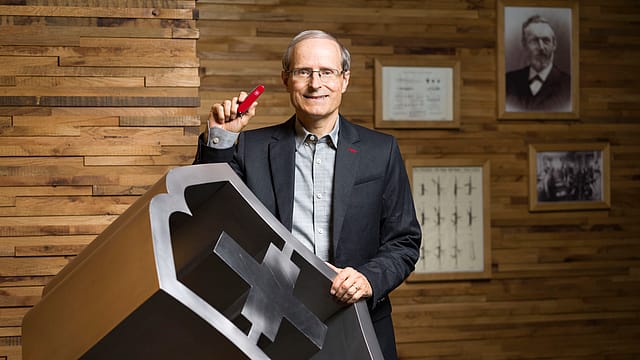Indian customers take time to embrace a brand: Victorinox chief Carl Elsener
ADVERTISEMENT

Carl Elsener, the chairperson of Victorinox AG, the company best known for its "little red knife" and which manufacturers Swiss Army knives, wristwatches and travel luggage and accessories spoke to Fortune India's Pavan Lall about what could impact business and how the subcontinent has been vastly different from the other markets they operate in. 'Victorinox' — derived from Victoria, the founder's wife, and the French abbreviation of "inoxydable" (stainless steel) — was founded in Switzerland 138 years ago and remains family-owned. Pavan Lall caught up with Carl Elsener, the great grandson of founder Karl Elsener. Excerpts:
Q. In all the years that Victorinox has operated in India how does it see the country as a crucible for learning that can be applied to other countries?
A: We inaugurated Victorinox subsidiary in India 15 years ago. Back then India was not conventionally a strong DIY country like a typical European or American one and so, a pocket knife was not a natural buy. Our pocket knife was mainly bought as a gift, a souvenir, an article of possession or a little bit of Switzerland in one's pocket but with rise of the the do-it-yourself culture and mindset being appreciated by Indian consumers over time, the pocket knife is now finding rapidly increasing users for its functionality. Similarly with upper middle income and above households employing domestic cooks at home, we experienced a rising demand for our kitchen knife in the past years thanks to our engage and educate initiatives. More and more Indians have started baking, becoming home chefs, and following their passion for cooking and that has given a boost to people investing in quality and value for money kitchen knives and cooking accessories. With a population of more than 1.38 billion people, there are approx. 10 million potential households that can afford to buy a premium consumer brand. This makes it challenging for us to reach out to our target audience though the enhanced use of e-commerce and the digital world has made this easier in the past few years. Indian customers of premium products are well travelled, possess high disposable incomes and are looking to buy good quality products. However, a typical Indian customer also takes time to relate to and embrace a brand. That means a company needs patience.
Q. Give us a sense of the biggest surprise India had as a market?
One of the surprises we experienced was the transformation of the mindset of the Indian consumers with their rising openness to pay more for good quality products – as against the conventional mindset of India being a country that functions on a low-price consumer goods business model. We believe a good, value for money product is welcomed much more in India today than in India 10 years ago.
Q. So, is there something you do differently here versus other markets?
In most markets, our pocket knife is our bestselling product. However, in India it is our Victorinox watches. The watch category sales percentage here is 3 times more than the global average (30% in India, and 10% globally). Travel gear is also performing 2.5 times better here than the global average (40% in India and 17% globally). Our affordable brand Wenger with the travel gear and Swiss made watches have a much bigger customer base here in India than most of our big markets. The team size is higher than most other markets – due to size and an inevitable need of higher support functions teams.
Q. How will the FTA with India change the game for you specifically?
A. If import duty rates are brought substantially down, the better prices that we can offer on our products would give access to a much bigger base of customers, especially in such a large country such as India. For example, if import duty on watches is brought down, not just us, the entire Swiss watch industry could see access to a far higher number of potential customers with the drop in price that we could pass on to the customers. We also hope FTA could include a key point of domestic company status or near to domestic company status to a Swiss company investing in India. For example, we believe if repatriation of capital is permitted for Swiss investments in India may be fully or partially, or if FDI in retail conditions are eased for Swiss companies in India, it will make it a much more attractive market for investments. Of course, for our company if there is a free trade agreement between Switzerland and India, it will help us become even more competitive in this huge market.
Q. I understand that luggage is a key growth area for you and given that there are not many local premium brands, is that an area you could double down on?
We can feel that in India, travelling is quite an important option for us, and we see potential there. Travel is a huge opportunity for Victorinox and also for our second brand, which is the Wenger brand.
Q. Given that much of your work relies on quality steel products do you see a potential for local sourcing here for all your products?
We are always open to looking at different suppliers. For our product and for the company, we have some very special needs. Often we find that steel manufacturers are not open to working with these specific steel requests we have. At the moment we work together with steel manufacturers in France and Germany who are specialised for this industry.